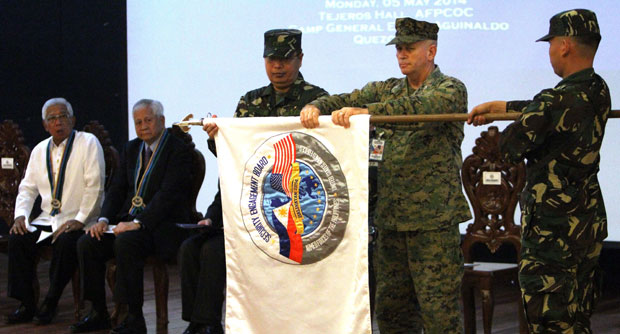Officials defend EDCA at Balikatan rites

Video by INQUIRER.net’s Ryan Leagogo
MANILA, Philippines—As the Chief of Staff of the Armed Forces of the Philippines formally opened the 30th Balikatan exercises, government officials used the ceremony to defend the much criticized Enhanced Defense Cooperation Agreement.
In front of Filipino, American and Australian troops, AFP Chief of Staff General Emmanuel Bautista announced and opened Balikatan 2014 with the issues of maritime security and maritime domain awareness the focus of the yearly exercise.

The Balikatan flag is unfurled by Col. John Rutherford and MGen Emeraldo Magnaye during the opening ceremony of the Philippines-United States Exercise Balikatan 2014 at the Tejeros Hall, AFPCOC, Camp General Emilio Aguinaldo, Q.C. INQUIRER PHOTO/LYN RILLON
“Through the Balikatan exercises, the United States and the Philippines have learnt from each other in interoperability, peace and security in the Asia Pacific,” Bautista said at the Tejeros Hall at Camp Aguinaldo Monday.
Bautista said that the new instalment of the Balikatan, which would have the Australian Defense Force for the first time, would develop military capabilities of the parties and “demonstrate Philippine and US relationships in maritime security.”
“Balikatan would strengthen our capability to manage such threats, and disasters,” said Bautista who referred to natural calamities as non-traditional threats and which showed the strong alliance of the two nations. “Both militaries can work together in the spirit of bayanihan in contingencies.”
US Ambassador to the Philippines Philip Goldberg said that the 2014 Balikatan is “significant” as the Philippines commemorates the 70th anniversary of the Philippine liberation during World War II.
“We fly different flags today but we share the same common goal of peace and security and prosperity in the Southeast Asia,” Goldberg said. “While we look to the past and honor the heroes who fought for our freedom, we should use the lessons they thought us to move the alliance to the 21st century.”
“Shoulder to shoulder ready to defend when needed.”
Defense Secretary Voltaire Gazmin echoed Goldberg’s historical analogy saying that the Balikatan would return to the very place where the first semblances of Filipino-American cooperation took place.
“They worked together to free the Philippines from foreign oppressors, amazingly, 70 years later, the same of working together was manifested when Yolanda struck in the same place where President Sergio Osmeña and General Douglas MacArthur landed in 1944 in Palo, Leyte.”
Big boys talk
Amid the constant wave of criticisms from the militant groups, officials in the higher offices of the military, and foreign affairs aired their views and defended the EDCA.
Major General Emeraldo Magnaye, the Philippine Exercise Director of the Balikatan 2014, said EDCA would strengthen Philippine-US ties.
“Signing of the EDCA would expand the rotational presence of our American allies in the Philippines and the visit of President Barack Obama highlighted the cooperation among our forces outside the Balikatan,” Magnaye said.
Foreign Affairs Secretary Albert del Rosario, the guest of honor during the opening ceremonies, said EDCA is a “cornerstone for peace and stability in the Asia Pacific.”
“EDCA elevates to a higher plane our defense agreement and provide new momentum to our partnership,” del Rosario said. “This increases a regional importance in our alliance.”
Del Rosario added that EDCA would improve the maritime security, maritime domain awareness and disaster response of the military.
Gazmin added that EDCA is meant solely to improve the Philippine-US military cooperation.
“This Balikatan has been held after we have forged the EDCA,” Gazmin said. “We as allies both recognize it would serve as enabler, making it effective for us to conduct combined exercises.”
Goldberg, who co-signed with Gazmin the document, said EDCA would be helpful to Filipinos in “maintaining the peace.”
He said EDCA would not only enhance the Philippine’s military capabilities but would bolster the presence of US troops in humanitarian and relief operations.
RELATED STORIES